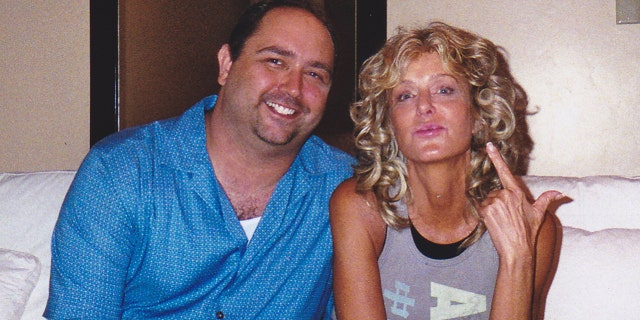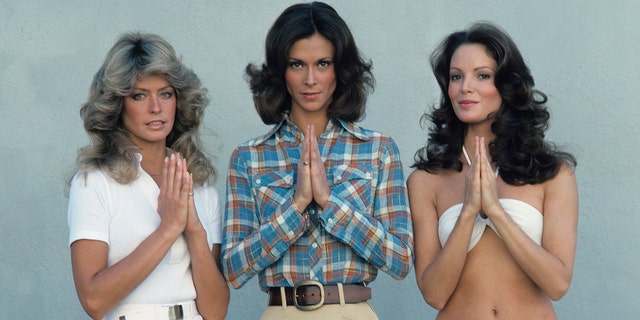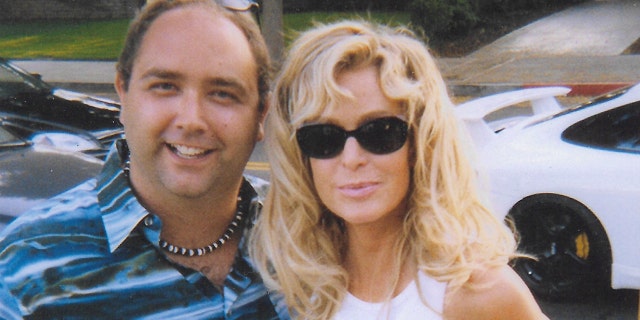When Farrah Fawcett was diagnosed with anal cancer in 2006, she had one reason to fight back – her only son Redmond.
The actress, a sought-after poster girl who soared to fame in the hit ‘70s series “Charlie’s Angels,” passed away in 2009 at age 62. She previously chronicled her medical journey in a candid documentary titled “Farrah’s Story” in hopes of raising awareness of the disease.
Fawcett’s former assistant Mike Pingel, who worked for the late star between 2005 and 2007, told Fox News Digital that his boss never lost faith during her grueling health battle.
Farrah Fawcett passed away in 2009 at age 62. (Photo by ABC Photo Archives/Disney General Entertainment Content via Getty Images)
“Farrah fought as hard as she could,” said the author of “Channel Surfing: Charlie’s Angels.” “All of it was to be here for Redmond, her child. Redmond was her moon, her stars, her sky, her heart. Her father was also, but Redmond was her life. She fought tooth and nail to continue to live, to be with him. And she documented her journey through cancer… because she wanted to help others. Farrah was not only an icon, but she wanted to help everybody with… her life.”
“She did everything she could,” Pingel shared. “Whether it was experimental treatments in Germany or just bringing to light different things about the cancer world, she felt that’s what she needed to do with her journey, to help others.”

Farrah Fawcett, center, left “Charlie’s Angels” to pursue a film career. (Photo by ABC Photo Archives/Disney General Entertainment Content via Getty Images)
Fawcett has been on Pingel’s mind for a special reason. Tuesday marks the anniversary of the “Charlie’s Angels” pilot movie, which premiered on March 21, 1976. It led to one of the most popular TV shows of the 1970s. Fawcett, whose pinup fame led producers to cast her, played Jill Munroe, the feathered blonde who captivated audiences alongside Jaclyn Smith and Kate Jackson.

Mike Pingel served as an assistant for Farrah Fawcett between 2005 and 2007, (Courtesy of Mike Pingel)
“Charlie’s Angeles,” created and produced by Aaron Spelling and Leonard Goldberg for ABC, finished the 1976-1977 season as the number five network show, making it the highest-rated TV debut in history at that time, The New York Times reported.
As Pingel helped Fawcett run her home, he quickly learned what a savvy businesswoman she was in Hollywood. She also became a fast friend.
“As a boss, she was an amazing person,” Pingel explained. “She was exactly who you thought she was. A down to Earth Texan – just a good, wonderful woman. And the smartest woman I knew. She knew what her image was worth. She knew what she was worth… She was just the smartest person in the room and the person everybody wanted to meet. Jay Bernstein, who was her old manager, once told me, ‘Everybody wanted to meet Farrah from the busboy to the Prince of Wales. Whoever was in the room wanted to meet Farrah wherever she was.’ And it was absolutely true.”

Then Prince Charles, right, is seen here in 1978 meeting singer Johnny Mathis, left, and Farrah Fawcett backstage at The London Palladium. (Photo by PA Images via Getty Images)
A year into Pingel’s employment, Fawcett was diagnosed with cancer. Before the grim news, Fawcett was still in demand, frequently receiving scripts from filmmakers who were eager to work with her.
“She was choosy in everything she did,” said Pingel. “She wanted to do good projects… She wanted to do projects that spoke on things, but she also liked doing fun things.”
Fawcett left “Charlie’s Angels” after one season and only returned sporadically. While she was always associated with the series, Pingel claimed Fawcett had no regrets about walking away.
CLICK HERE TO SIGN UP FOR THE ENTERTAINMENT NEWSLETTER

From left to right, Farrah Fawcett, Kate Jackson and Jaclyn Smith during the 58th Annual Primetime Emmy Awards at The Shrine Auditorium in Los Angeles. (Photo by Jeff Kravitz/FilmMagic)
“Farrah had a huge career,” said Pingel. “’Charlie’s Angels’ was just one year out of her career. She knew that it catapulted her… She [and the other girls] couldn’t go anywhere with paparazzi and fans following them everywhere… She always loved ‘Charlie’s Angels.’ And a lot of it was the camaraderie with Jaclyn and Kate. They were sisters. As a threesome, they shot into stardom together… They were always going to be connected to this embodiment of the ‘70s, the golden years of television. She really embraced it. She enjoyed it. [And] she was happy when she left. She thought she did what she could with the character, and she went on to do… great work as an actress.”

From left to right, Farrah Fawcett-Majors, Kate Jackson and Jaclyn Smith played undercover detectives Jill Munroe, Sabrina Duncan and Kelly Garrett of the Charles Townsend Detective Agency. The trio, affectionately called “Angels” by their unseen-but-heard-over-speakerphone boss Charlie Townsend, voiced by John Forsythe, were assigned missions from Townsend and their office-based sidekick John Bosley, played by David Doyle. (Photo by ABC Photo Archives/Disney General Entertainment Content via Getty Images)
“I don’t think she regretted any of it,” Pingel added.
Fawcett first became famous when a poster of her in a red bathing suit sold more than twice as many copies as posters of Marilyn Monroe and Betty Grable combined, The New York Times reported. No poster has achieved anywhere near its popularity since. It was shot at the Bel Air home she shared with her husband, actor Lee Majors. She chose a one-piece to hide a childhood scar on her stomach.

Farrah Fawcett, left, and Lee Majors were married from 1973 until 1982. (Photo by ABC Photo Archives/Disney General Entertainment Content via Getty Images)
After Fawcett left “Charlie’s Angels,” she kept busy pursuing acting. The 1984 film “The Burning Bed,” which earned Fawcett an Emmy nomination, shed a spotlight on domestic violence.

Farrah Fawcett, center, and her longtime love Ryan O’Neal, right welcomed their son Redmond, left, in 1985. (Photo by Steve Grayson/WireImage)
Fawcett’s marriage to Majors lasted from 1973 until 1982. She found love again with actor Ryan O’Neal. The longtime couple welcomed their son in 1985.
At the time of Pingel’s employment, Redmond was grown, but Pingel instantly witnessed how much Fawcett adored her child.
“I think Farrah felt Redmond was the best thing she ever did,” said Pingel. “… She did everything that she could for Redmond. She would light up whenever Redmond would come over. And it was all about Redmond. It didn’t matter what was going on. If Redmond came over, it all just fell to the wayside. She just adored her son. You can just tell her in her eyes, you could just tell the mother’s love for her son. It was endless and ongoing. I’m sure she’s still watching him from above.”

Farrah Fawcett’s last words were her son’s name, according to a pal. (Photo by Chris Farina/Corbis via Getty Images)
In 2019, Fawcett’s friend Mela Murphy, who was by her side at St. John’s Health Center in Los Angeles, told People magazine that the actress had Redmond on her mind during her final days.
“She was saying his name, ‘Redmond,’’ Murphy recalled at the time. “That was the last thing she said. I told her I’d take care of him, that I’ll always be there for him. I said, ‘You can go now.’ It was just a few hours before she died.”
Pingel said that there are still moments when he suddenly feels compelled to call Fawcett. While shopping, he will be reminded of an outfit that his boss would have loved.
‘CHARLIE’S ANGELS’ STAR JACLYN SMITH, 76, BREAKS DOWN SECRETS BEHIND VIRAL YOUTHFUL PHOTOS

Mike Pingel still has fond memories of his former boss. (Courtesy of Mike Pingel)
Additionally, there was one conversation between the two that he still vividly remembers about her sex symbol status.
“One day we’re in the condo, and she looked at me and goes, ‘Mike, what’s an icon?’” he recalled. “And I go, ‘I’m looking at one.’ And she goes, ‘No, what is it?’ I told her she was like the Marilyn Monroe of the ’70s. I think she understood what I was trying to say, but she didn’t feel like she was an icon. She just felt that she was an actress, a mom, a person that had to do the windows – I wouldn’t do windows… I never had to make the doorway bigger to get her through because her ego was huge.”

Farrah Fawcett dancing with her father, circa 1978. (Photo By Robin Platzer/Twin Images/Getty Images)
“Farrah did not have an ego,” Pingel shared. “She was always that sweet Texas girl. Her parents raised her well and she loved her parents so much. Daddy Fawcett would call every day. Regardless of what was going on – if she was sleeping, talking to somebody else – everyone got dropped off because Daddy was calling, and she had to take his call. She was daddy’s girl, America’s girl and TV’s sweetheart. That’s Farrah Fawcett.”